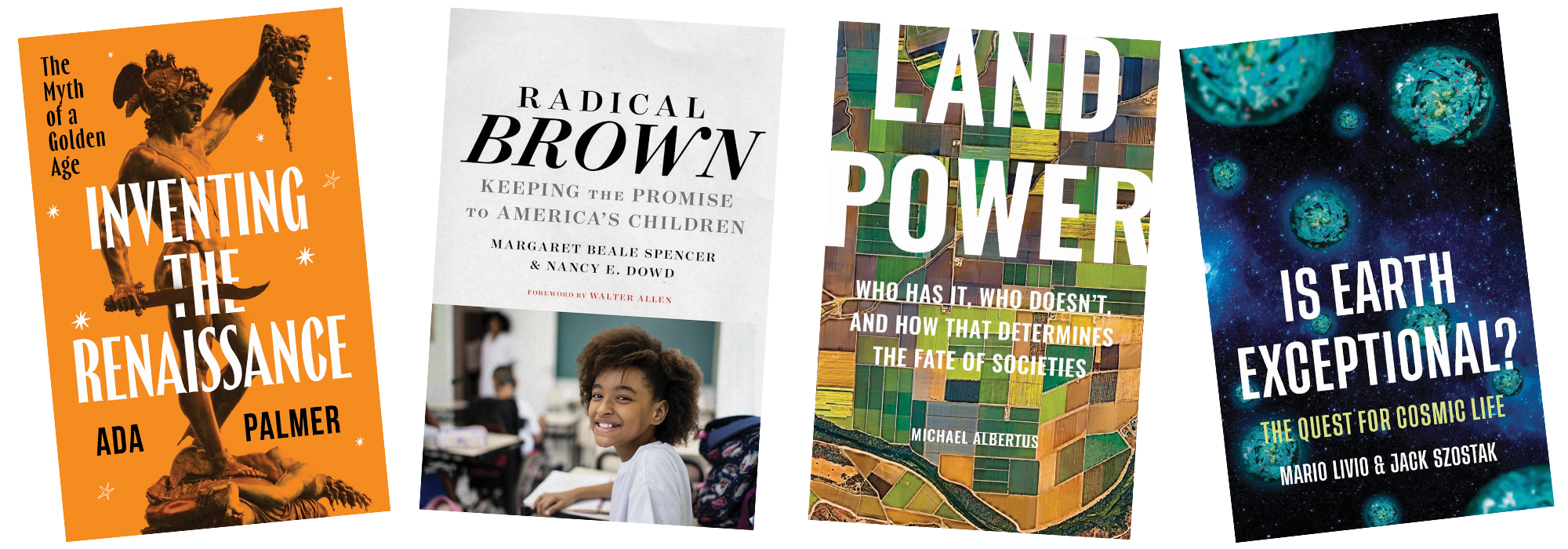
A selection of recent books by UChicago faculty members.
Inventing the Renaissance: The Myth of a Golden Age
By Ada Palmer, Associate Professor in the Department of History and the College
The Renaissance is widely understood as a golden age of art, culture, and scholarship that emerged in sharp contrast to the Middle Ages. But this view of the period is misleading, writes Ada Palmer. She examines how we have constructed myths about the Renaissance over the past several centuries and what purposes these myths have served. In character portraits of 15 Renaissance personalities, some prominent (such as Michelangelo, Lorenzo de Medici, and Machiavelli) and some obscure (such as Manetto Amanatini and Julia the Sibyl), she shows that the Renaissance was more complex, diverse, international, and desperate than we like to believe.
Radical Brown: Keeping the Promise to America’s Children
By Margaret Beale Spencer, PhD’76, Charles F. Grey Distinguished Service Professor Emerita in the Department of Comparative Human Development, and Nancy E. Dowd
Seventy years after the Supreme Court decision in Brown v. Board of Education established that segregation in K–12 public schools was unconstitutional, developmental scholar Margaret Beale Spencer and legal analyst Nancy E. Dowd assess the decision’s legacy. Rereading the ruling in its historical context, Spencer and Dowd conclude that the comprehensive mandate for equality that the decision laid out has not been realized. Instead they find that post-Brown policies have entrenched racial inequality in schools, harming the development of all children. Building from human development science, Spencer and Dowd offer concrete steps that legislators, school leaders, educators, and scholars can take to achieve equality grounded in a dedication to the common humanity of all children.
Land Power: Who Has It, Who Doesn’t, and How That Determines the Fate of Societies
By Michael Albertus, Professor in the Department of Political Science and the College
Land has long been a determinant of economic and social power. The past two centuries have been characterized by what Michael Albertus calls the Great Reshuffle, with land ownership around the world shifting dramatically through imperialist settler movements as well as through various reform movements—such as the formation of communes in the Soviet Union—intended to transfer land ownership from the few to the many. Land reallocation, Albertus explains, has the potential for broad social benefit, but in many cases these systems have left legacies of racial and gender inequality, environmental degradation, and underdevelopment. Albertus traces the history of land ownership policies to shed light on the structure of modern societies around the world and shares some recent efforts to think differently about land distribution.
Is Earth Exceptional? The Quest for Cosmic Life
By Mario Livio and Jack Szostak, University Professor in the Department of Chemistry and the College
“How likely is it for life to emerge on the surface of a potentially habitable planet?” This fundamental question is driving research across the sciences. Astrophysicist Mario Livio and chemist-biologist and Nobel laureate Jack Szostak highlight two major lines of inquiry that aim to provide an answer: Chemists and biologists are working to understand how life first developed on Earth, while astronomers and astrophysicists seek signs of life elsewhere in our galaxy. If there is life elsewhere in the Milky Way, they write, we may well find it “within the next one or two decades.” Livio and Szostak outline the major discoveries in these areas that have brought us to our exciting current moment, and they take readers behind the scenes of the latest research into the origins of life
